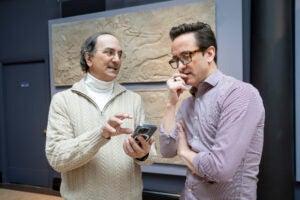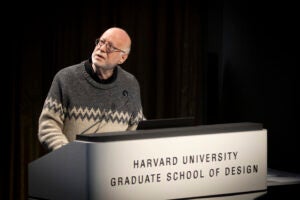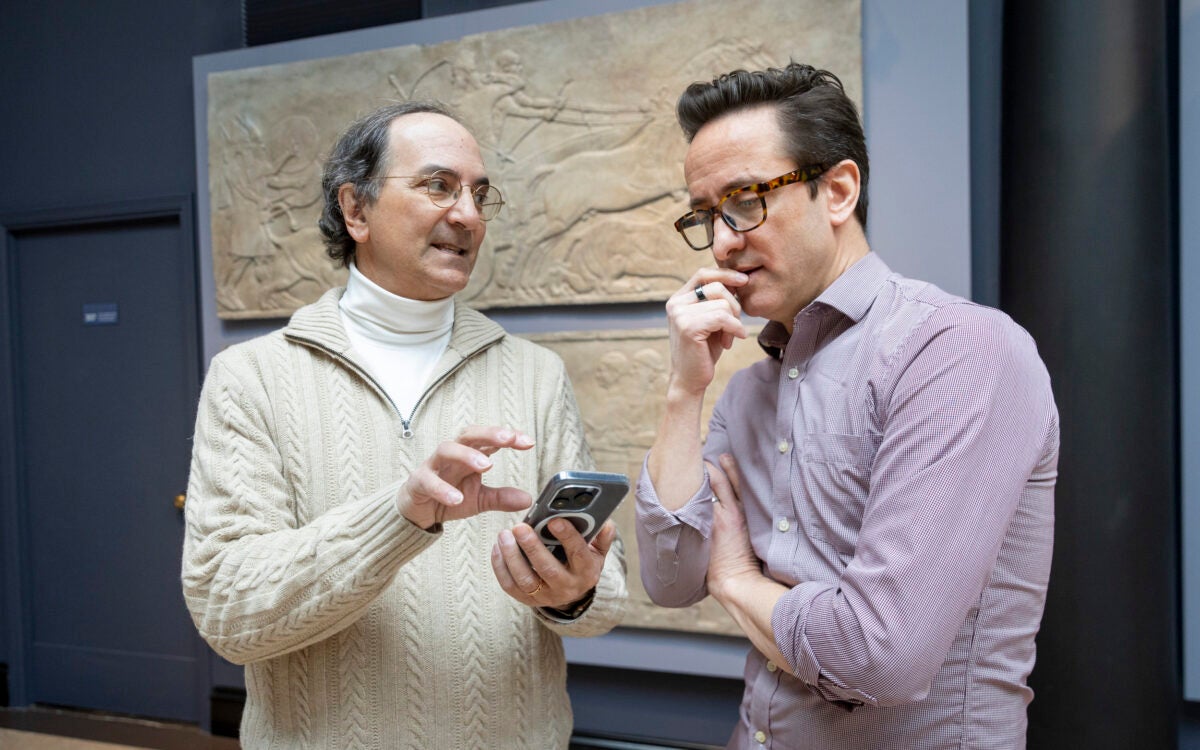Johnson at 300
Celebrating a man of letters whose words still sing and sting
Samuel Johnson’s “Dictionary of the English Language” was first published in 1755 as his attempt to both rein in and celebrate the galloping vigor of English. For 150 years, it was considered the pre-eminent compilation of its kind.
But Johnson — born 300 years ago this coming Sept. 18 — was more than its author. He was England’s most famous man of letters, rising from humble origins as the son of a provincial bookseller to become an accomplished poet, literary critic, playwright, essayist, and (not least) conversationalist.
Johnson — in all his fullness, contradiction, erudition, and energy — was remembered, reviewed, and revered late last month (Aug. 27-29) in a Harvard literary celebration.
The three-day event, “Johnson at 300: A Houghton Library Symposium,” drew more than a hundred Johnsonians from all over the world. A few were unaffiliated with the academy, including a Boston software designer, a Texas biology student, a retired New York City trial lawyer, and a Florida judge who not long ago was kicking down doors as a prosecutor on police raids.
The symposium was the largest scholarly celebration of Johnson this year in the United States, said organizer Thomas Horrocks, Houghton’s associate librarian for collections. He called the author “this good and great man.”
The gathering came with a bonus: “A Monument More Durable than Brass,” a Houghton exhibit that samples the library’s 15,000-item Donald and Mary Hyde Collection of Dr. Samuel Johnson. Look for Johnson’s earliest surviving letter, his earliest diaries (kept in Latin), rare manuscript fragments from the original “Dictionary,” and even the great man’s silver teapot. The larger collection itself, at Harvard since 2004, “is the greatest gift an archivist could have,” said Houghton assistant curator John H. Overholt.
During sessions at Emerson Hall and Lamont Library, presenters drew Johnson through multiple cultural and literary filters: revolution, fledgling America, gender, religion, the book trade, intellectual history, fine arts, and the “circle” (including his biographer and fellow depressive James Boswell).
Understandably, one symposium trope was Johnson and his influence on the art of biography, both as a writer and a subject. His six-volume “Lives of the Most Eminent English Poets,” published just a few years before he died, enlivened the genre and recast it as a literary form. And his fame was assured by Boswell’s “The Life of Samuel Johnson,” itself a landmark of biography.
Understandably also, there were two sessions on Johnson’s “Dictionary,” which took him nine years to write — though 80 percent of the work went into a feverish last 18 months, according to speaker Anne McDermott. She teaches at the University of Birmingham (U.K.) and has for 20 years been working on a scholarly edition of the 42,000-entry tome.
McDermott delivered a paper on Johnson’s compilation methods that argued, in part, that he wrote the dictionary twice, abandoning the first version after possibly getting as far as “U.”
She also noted allusions of guilt in Johnson’s essays written concurrently with the dictionary — guilt at not finishing sooner. The same passages also echo his self-confessed admission of the dictionary’s imperfections. “The profit is less,” one passage reads, “than hope had pictured it.”
Also informing the symposium was Johnson’s ceaseless and untrammeled commentary on the world around him, including what he considered the grasping barbarity of England’s American cousins. He declared, famously, “I am willing to love all mankind, except an American,” and once called on slaves and American Indians to rise up against the rebels.
Johnson also disliked imperial expansion, whether by England, France, or by a young America that was seemingly bound to exterminate its native peoples. He hated black slavery too, which was both another bite at upstart Americans and another sign of his moral prescience.
“The wisdom of his scruples about America,” said Johnson scholar Thomas M. Curley of Bridgewater (Mass.) State College, “deserves special consideration.”




